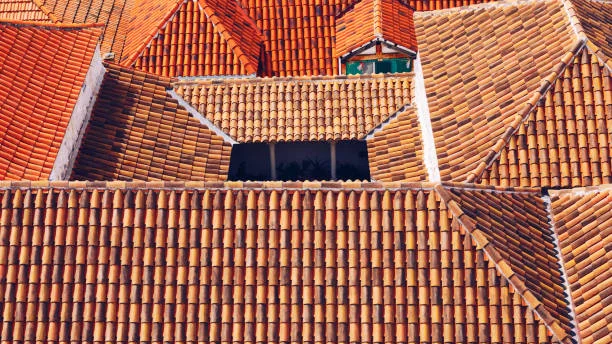A tile roof is a significant investment, prized by homeowners for its durability, timeless aesthetic, and long lifespan. Unlike other roofing materials, a well-maintained tile roof can last for 50 years or even longer. However, “long-lasting” does not mean “maintenance-free.” Even the most robust tile roofs are susceptible to damage from severe weather, shifting foundations, and simple wear and tear over time. For homeowners in Allen, Texas, where intense heat, strong storms, and occasional hail are a reality, knowing the warning signs of a compromised roof is essential to prevent a small problem from escalating into a costly disaster.
Ignoring the subtle cues that your tile roof is in distress can lead to serious issues. A broken or cracked tile may seem minor, but it can create an entryway for water that damages the underlayment, causes structural rot, and leads to mold growth in your attic. This guide will outline five key signs that your tile roof needs professional inspection, empowering you to be proactive about your home’s protection and ensuring its longevity.
Stick around and explore more article that might catch your interest!
1. Cracked or Broken Tiles
This is perhaps the most obvious and critical sign of a roofing problem. A tile roof is a system of overlapping barriers designed to shed water. When a tile is cracked or broken, that barrier is compromised. These cracks can be caused by a variety of factors:
- Impact Damage: Hail, falling tree branches, or other debris can chip or shatter tiles.
- Foot Traffic: Walking on a tile roof without proper knowledge can easily lead to cracks.
- Age and Weathering: Over decades, exposure to intense sun, heat, and seasonal temperature shifts can make tiles brittle and more prone to cracking.
Even a hairline crack can allow water to seep through, where it will eventually saturate the underlayment. If you notice any cracked, chipped, or missing tiles from the ground, or especially after a severe storm, it’s a clear signal that your roof requires an immediate professional assessment to prevent water damage from spreading.
2. Water Stains on Ceilings or Walls
A leaky roof is often not discovered until it has already caused damage inside the home. Water stains on your ceiling or walls, a musty odor in the attic, or peeling paint near the roofline are all telltale signs of water intrusion. These symptoms are an alarm bell that the underlayment beneath your tile is failing.
The underlayment is the waterproof layer installed beneath the tiles that acts as a final barrier against moisture. While the tiles are the primary line of defense, the underlayment is what truly protects your home from water. If a tile is broken or dislodged, the underlayment is exposed to the elements and can degrade or tear over time. Once this happens, water will find its way into your home’s structure. By the time you see a water stain, the leak has been happening for a while, and a professional inspection is needed to find the source and assess the full extent of the damage.
3. Slipping or Misaligned Tiles
Tiles should sit perfectly aligned and securely fastened to your roof. If you notice tiles that are slipping out of place, crooked, or sitting askew, it’s a significant cause for concern.
Misaligned tiles are often a result of:
- Improper Fastening: If the tiles were not securely fastened during installation, they can easily shift.
- Age and Foundation Shift: Over a long period, a home’s foundation can settle, causing a slight shift in the roof’s structure that can loosen tiles.
- Storm Damage: High winds can exert enough force to lift and shift tiles, breaking their seal and making them more vulnerable to future damage.
A misaligned tile creates a gap where water and wind-driven rain can easily enter. It can also lead to a domino effect, where one loose tile can knock others out of alignment. This compromises the entire roofing system’s integrity and should be addressed immediately by a qualified roofing professional.
4. Moss, Algae, or Discoloration
While not an immediate sign of a catastrophic failure, the presence of moss, algae, or significant discoloration on your roof should not be ignored. A clean, well-maintained tile roof has an aesthetically pleasing appearance, and any growth or staining indicates an underlying moisture problem.
- Moss and Algae: These growths thrive in damp conditions. Moss, in particular, is highly effective at absorbing and retaining moisture. As it grows between or under tiles, it can lift them, create a pathway for water, and eventually cause the tiles themselves to deteriorate.
- Discoloration and Efflorescence: White stains, known as efflorescence, can appear on porous tiles. This is a calcium carbonate buildup that occurs when water absorbs into the tile. While often harmless, it can be a sign that a tile is old and more susceptible to water damage. Darker stains can be a sign of algae growth or even a leak that is causing a buildup of debris.
These growths and discolorations point to a moisture issue on the roof that needs to be addressed before it becomes a bigger problem, potentially by cleaning or replacing the affected tiles.
5. Granules in Gutters or Piles of Debris
Your gutters are designed to channel water away from your home, but they can also serve as a crucial diagnostic tool. If you notice an accumulation of tile granules or small pieces of tile debris in your gutters, it is a sign that your tiles are deteriorating. Tiles, especially concrete ones, are coated with a protective layer that erodes over time. The appearance of these granules means that the protective coating is wearing away, leaving the tiles vulnerable to the elements.
Finding broken pieces of tile roof debris or mortar in your gutters or on the ground around your house is a clear indication of damage. It could be from cracked tiles, a failing underlayment, or an issue with the mortar on the ridge cap. Any such debris should prompt an immediate inspection to assess the source of the problem and prevent any further damage. For Allen, Texas homeowners, keeping gutters clear of debris is also important for roof health, especially during the heavy rainfall that can accompany Texas storms.
Frequently Asked Questions
How often should I get my tile roof inspected?
It is recommended to have your tile roof professionally inspected at least once a year, and especially after any major weather event like a severe storm. This proactive approach helps to catch minor issues before they become major problems, ensuring the longevity of your roof.
Is it safe to walk on my tile roof to inspect it?
No, it is not recommended for homeowners to walk on a tile roof. Tiles, especially older ones, can be very brittle and can easily break underfoot, creating new damage and a serious fall hazard. This task should always be left to a trained and insured professional.
Can I fix a broken tile myself?
While a DIY fix may be tempting, it is not recommended. Improper installation of a single tile can create a leak that leads to significant water damage. Professional roofers have the right tools and expertise to properly remove and replace a tile, ensuring a secure and watertight seal.
What is a roof underlayment and why is it so important?
The underlayment is a water-resistant or waterproof barrier installed directly on the roof deck before the tiles are laid. It serves as a vital secondary defense against water intrusion, protecting the roof’s structure from any moisture that gets past the tiles themselves. A damaged underlayment is a common cause of leaks.
Does a tile roof last forever?
While a tile roof has a very long lifespan, it does not last forever. The tiles themselves can be very durable, but the underlayment beneath them typically has a shorter lifespan. Regular inspections and maintenance, including replacing the underlayment, are essential to ensure the roof’s longevity.
About Pickle Roofing
Pickle Roofing is a premier residential and commercial roofing company with over three decades of experience serving the Allen, Texas, community and the surrounding DFW area. We specialize in providing comprehensive roofing services, from professional inspections and minor repairs to full-scale replacements. Our certified team of experts is dedicated to delivering superior craftsmanship and using high-quality materials to ensure your roof is durable, secure, and built to last. We are committed to transparency, honesty, and providing our customers with the peace of mind that comes from a job well done. For all your roofing needs, you can count on Pickle Roofing.
Want to learn more? Our other posts are just a click away!
Business Name: Pickle Roofing Solutions
Address: 1333 W McDermott Dr # 200, Allen, TX 75013
Phone number: (972) 954-7186






